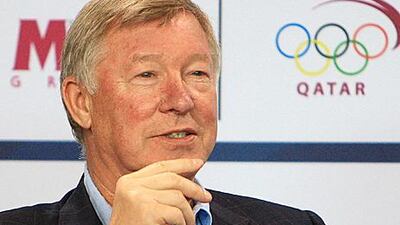I had a bizarre experience in Doha.
I walked into a room and walked out an hour later charmed utterly by … Sir Alex Ferguson.
That's right. A renowned grump before a packed audience told stories with such vivid detail and gave opinions with such unapologetic candour that I wound up feeling fond of Manchester United's imperious-bully-with-all-the-trophies.
I could not staunch the welling feeling for the sweet old coot. I might require minor surgery to remove it.
And being unforeseeable, it fit snugly with one whiplash week in the world's largest game.
In shocking news, Fifa released a report on Wednesday claiming its technical advisers had concluded the summer heat in Qatar might prove adverse for a colossal sporting event such as the World Cup.
That means the Qatar 2022 bid might need to counter. Start by saying of the (competing) United States, "Have you ever been to the hells known as Orlando or Dallas in June?" Mimic the American football Super Bowl of January 1992 in frigid Minneapolis, which shrewdly poked fun at itself. Note that by 2022, the world in general might have grown hotter, so this could be a chance to rehearse future life on Earth. Possible slogan: Toughen Up: Hone Your Climate-Change Coping Skills In A Climate Long Since Changed.
On Wednesday night, traffic jams snarled Doha as the Brazilians and Argentines nobody knew resided in Qatar plus other fans plus enthused Qataris came to see the titans oppose each other, and at least several Qataris purchased and/or donned Brazil or Argentina flags.
That, you do not see every day.
On Thursday, Fifa came out against bribery and corruption, and that you also do not see every day, and it really makes you wonder what they are thinking in Switzerland with such draconian plans to shortchange fans of bribery and corruption.
Bribery and corruption in sport have lent verve to many a tedious day upon a tedious planet, and if by some long-odds chance Fifa manages to quash them, where will people turn for subterfuge and fakery? Wall Street? So depressing.
By Friday, the English Premier League managed to add still another nationality to its remarkable array of ownerships. With India on board at Blackburn Rovers, England boasts owners from Abu Dhabi, Russia, India, Hong Kong, Egypt, Iceland (if you count West Ham United even though nobody knows who really owns West Ham) and the United States (four, or five if you count the Arsenal hotchpotch).
That would be half of the 20, even with Portsmouth relegated last spring after nobody could figure out who really owned Portsmouth, either.
Gaze behind one ocean or the other at the ever-more-distant US, which just welcomed its second ever non-North American owner in all four of its major sports. The 2.03m-tall Russian nickel magnate Mikhail Prokhorov bought the NBA's New Jersey Nets and made a mild splash with his pleasant frankness and his revelation that he owns a massive yacht but did not know its whereabouts and, besides, it makes him seasick.
While it's always good to have around a guy who owns a massive yacht but does not know where it is, the US lags far behind England in the centre-of-the-known-universe derby.
Yet even with all of that, Ferguson's appearance still resonated because it went beyond answering questions about news events and giving an honest effort for people eager to swarm him as if he were Leonardo DiCaprio and practice the weird, weird human ritual of having one's photograph taken alongside a celebrity. No, it reinforced two curious realities about sport.
One: Candour is so rare that it comes as bracingly refreshing when heard. Two: If you are a fan who wishes to keep a strict regimen of loving this side and loathing that, best to keep some distance. Access to the sports figures makes one realise their humanity and wreaks confusion, which is part of why reporters tend to cease fandom.
Ferguson, refreshingly old and accomplished enough to say what he pleases sans repercussions, practised candour about Wayne Rooney (crummy agent), England's plans for a football academy (first good idea in 35 years), his own tantrums (helpful if for "the right reasons"), modern players (fragile), modern players who say they came from working-class backgrounds ("Their grandfathers did."), even Manchester United's debt (suffers no interference now, but acknowledged a coming moment of truth when he will have to buy experience upon departures of the old guard).
And as he waxed on about East Stirling and Aberdeen, about Sir Bobby Robson and union stalwart Jimmy Reid, he resembled a gruff-but-favourite uncle back from adventures to tell us well-told stories. Why, it could almost thaw a cold, snide heart.

